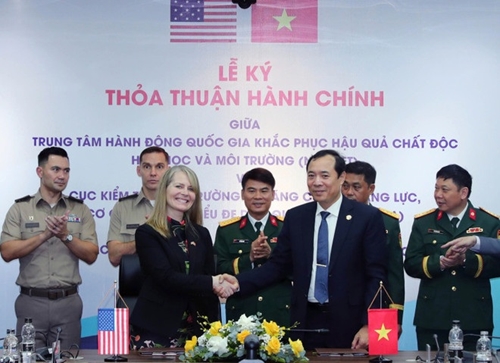June 21, 2025 | 22:19 (GMT+7)
Vietnam works to enhance capacity in response to biological, chemical, nuclear risks
Under the European Union (E.U.)’s global initiative on Chemical, Biological, Radiological, and Nuclear (CBRN) Risk Mitigation Centers of Excellence (CoE), Vietnam has implemented numerous projects aimed at strengthening national capacity in detecting, preventing, and preparing for CBRN-related threats.
According to Pham Van Toan, Deputy Director of the Vietnam Agency for Radiation and Nuclear Safety, who is also the country’s coordinator for the initiative, since becoming a member in 2011, Vietnam has consistently played an active and responsible role in regional projects.
    |
 |
|
As part of Vietnam–U.S. defense cooperation, the National Action Centre for Toxic Chemicals and Environmental Treatment and the On-Site Inspection and Building Capacity Directorate of the U.S. Defense Threat Reduction Agency sign an administrative agreement on cooperation to strengthen capacity in responding to CBRN incidents. (Photo: binhchunghoahoc.vn) |
As of 2025, Vietnam had participated in 22 component projects under the initiative in Southeast Asia. Among these, Project No. 98 focuses on enhancing emergency medical preparedness for CBRN incidents in the region. The program is scheduled to run from 2025 to 2027.
Raquel Duarte Davidson, lead expert for Project No. 98, praised Vietnam’s proactive participation in these activities and noted that Project No. 98 aims to mitigate the impact on public health in the aftermath of emergencies.
Toan added that, under Project No. 98, Cambodia has proposed joint simulation exercises to improve preparedness for radiological and nuclear incidents, especially those with cross-border implications. These activities are expected to deepen cooperation between Vietnam and Cambodia and help establish a trilateral coordination mechanism with Laos.
To enhance biosecurity in the region, Vietnam completed Project No. 81 in the first quarter of 2025. John Jones, lead expert for Project No. 81, emphasized the strong collaboration that took place during the implementation period from 2020 to 2024. This collaboration ensured that the project activities were closely aligned with the needs of the beneficiary institutions.
Launched in 2010, this initiative aims to build networks for cooperation both regionally and inter-regionally to reduce the risk of CBRN incidents and enhance hazard management in member countries. It also supports the implementation of international commitments related to the non-proliferation of weapons of mass destruction. Currently, the initiative includes 64 member countries from eight regions around the world.
Source: VNA